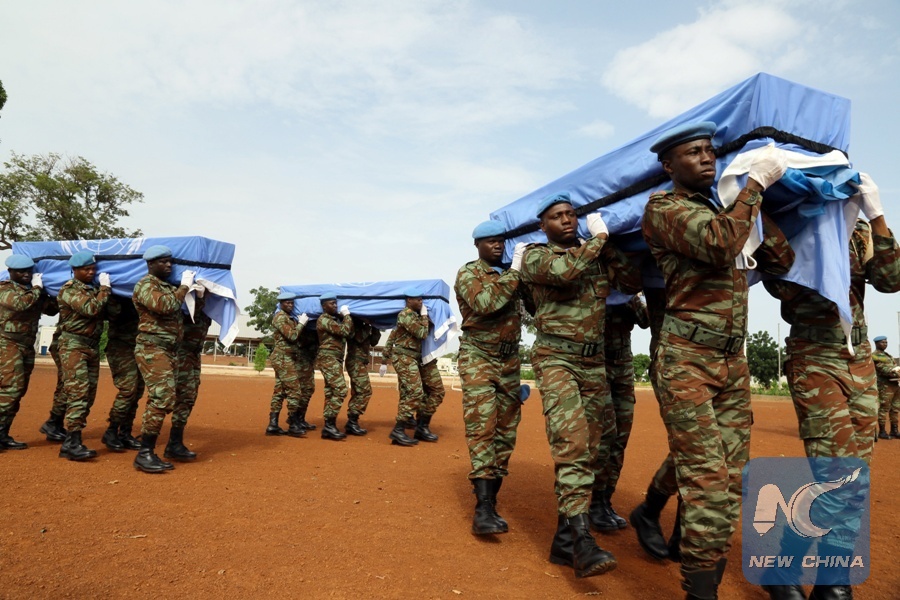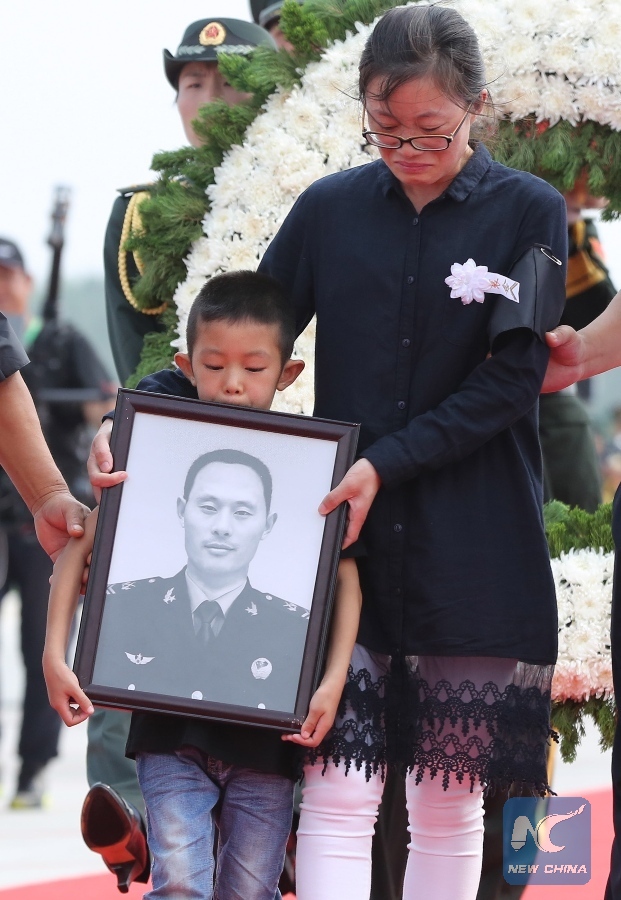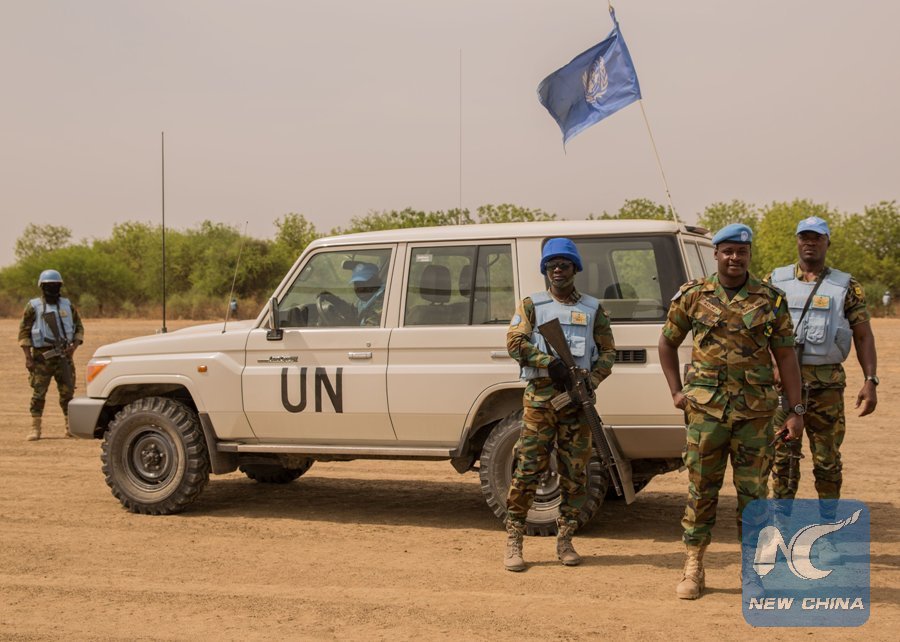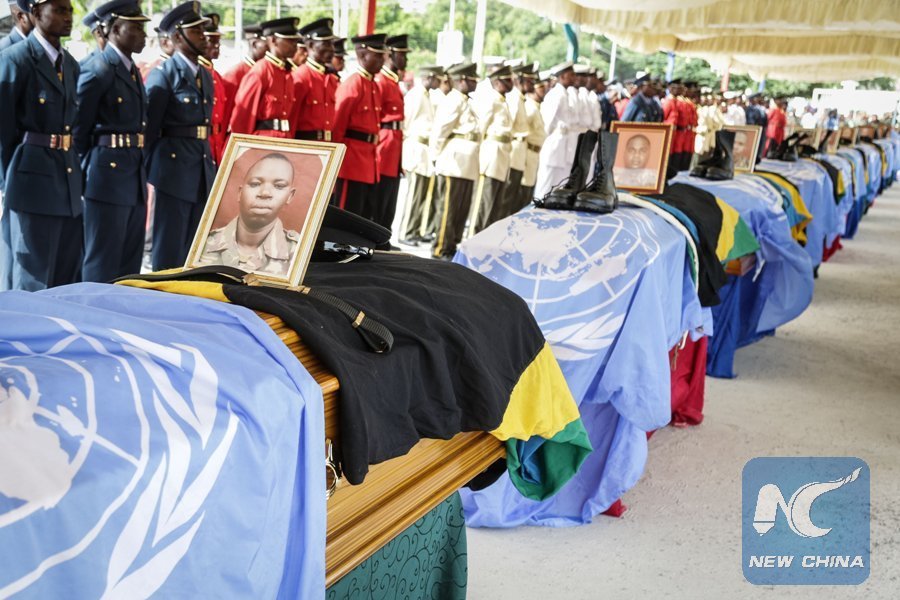
U.N. peacekeepers carry the coffins of the three United Nations soldiers from Bangladesh, who were killed by an explosive device in northern Mali on Sunday, during a ceremony at the MINUSMA base in Bamako, Mali Sept. 27, 2017. (Xinhua/REUTERS)
UNITED NATIONS, March 28 (Xinhua) -- UN Secretary-General Antonio Guterres on Wednesday called for strong collective action to deal with the serious challenges to UN peacekeeping.
UN peacekeeping faces serious challenges, particularly in four of its largest deployments: Mali, the Democratic Republic of Congo, the Central African Republic, and South Sudan, Guterres told the Security Council in a high-level debate on peacekeeping.
"UN peacekeeping missions now operate in far more dangerous, complex and high-risk environments. They are under threat from armed groups, criminals and terrorists, who have access to powerful modern weapons," he said. "UN peacekeepers are often under-equipped, under-prepared and unready for the dangerous environments in which they now operate. There are gaps in command and control, in culture, in equipment and in training."

Chinese UN peacekeeper Yang Shupeng's son, accompanied by Yang's wife Zou Lina, holds his portrait during a ceremony at Zhengzhou Xinzheng International Airport in Zhengzhou, capital of central China's Henan Province, July 20, 2016. A ceremony was held for the returning of the bodies of Corporal Li Lei, 22 and Master Sergeant Yang Shupeng, 33 who were killed in the recent fighting in the conflict-hit South Sudan, and other injured soldiers on Wednesday. (Xinhua/Yin Gang)
UN peacekeepers are vulnerable and are targeted for attack, said Guterres. Last year, 59 UN peacekeepers were killed in malicious acts, a sharp increase from 2016, when the figure was 34.
"We are damaging the instrument of peacekeeping, and indeed multilateralism itself, in creating unrealistic expectations. Lives and credibility are being lost," he said. "These challenges require strong, collective action."
He asked to refocus peacekeeping with realistic expectations; to make peacekeeping missions stronger and safer; and to mobilize greater support for political solutions and for well-structured, well-equipped, well-trained forces.
The United Nations is working to improve the safety and security of peacekeepers, he said. "We have already started to implement measures to improve the preparedness and response of missions at high risk by strengthening training, reviewing medical support, and addressing performance issues."

Ghanaian peacekeepers of the United Nations Mission in South Sudan (UNMISS) patrol on March 7, 2018 in Leer, where famine has been declared since February 2017. (Xinhua/AFP)
The world body is conducting independent reviews of the peacekeeping missions in a bid to refine their priorities and configuration, while assessing the viability of mandates and political processes. The goal is to ensure that the peacekeepers are well-trained, well-equipped and better postured for challenges and threats. "Too often in the past, our troops have been reduced to waiting in a defensive posture, giving hostile forces time and space to plan attacks," he said.

Soldiers of Tanzania People's Defence Force (TPDF) stand beside the coffins of Tanzanian peacekeeperes who were killed by suspected Ugandan rebels, at the headquarters of Tanzania People's Defence Force in Dar es Salaam on Dec. 14, 2017. (Xinhua/AFP)
Guterres said he has launched a new approach to sexual exploitation and abuse by peacekeepers so that victims have a clear way to report allegations, and the United Nations can work with troop- and police-contributing countries to address the allegations, end impunity and prevent future cases.
He stressed that efforts on the side of the United Nations, although critical, are not enough to meet the challenges. "Our chances of success increase dramatically when we work together with member states and share burdens, risks and responsibilities. We urgently need a quantum leap in collective engagement."

